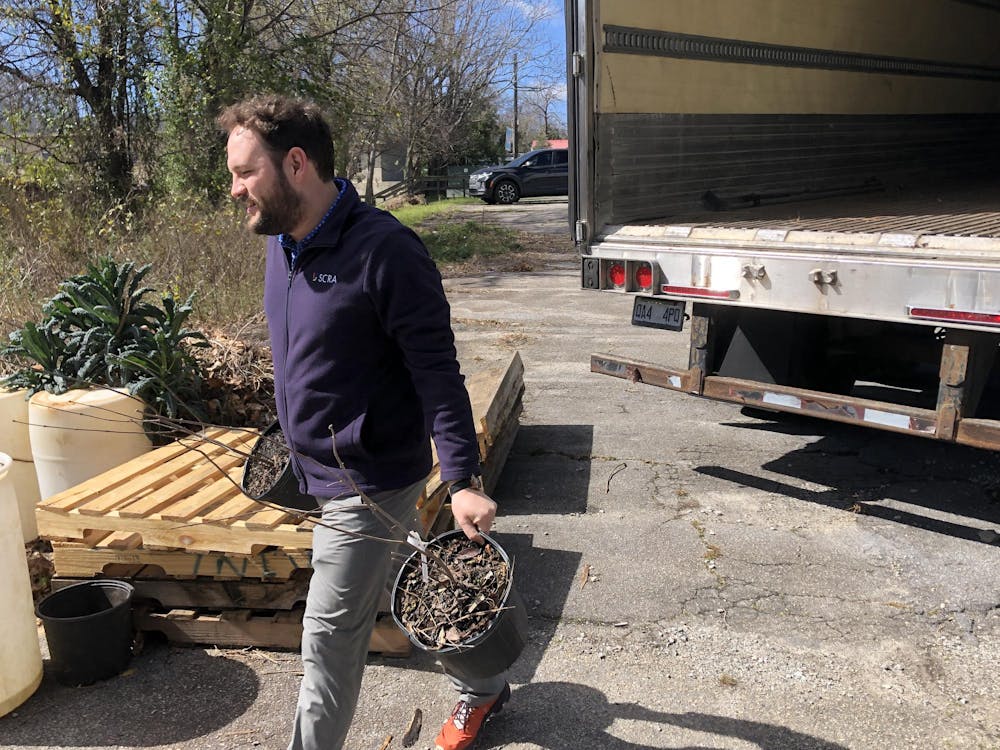Earlier this spring, Adam Elvington spent a morning unloading 100 tree saplings from a tractor trailer at the Gardner’s Outpost on Franklin Street. Two days later, Elvington, the member engagement chair of local nonprofit Columbia Green, gave all of the trees away.
The price of one tree was the removal of another. The giveaway was part of the Bradford Pear Bounty Exchange, a project that aims to replace an invasive species of pear tree with native alternatives. Over 11 species of native trees were available for Columbia residents, including white oaks and southern magnolias.
Property owners were able to receive up to five native trees by showing proof that they had removed an equal amount of Bradford pears from their property.
The statewide exchange program is a partnership between Clemson Extension and the South Carolina Forestry Commission. This year, Columbia Green joined the program in order to lead the distribution of native trees in the Columbia area.
In the past, Bradford pears were widely planted by both private gardeners and city governments, Elvington said.

Tree saplings sit outside of Gardener's Outpost on March 6, 2025. Over 100 native tree saplings were delivered for use in the Bradford Pear Exchange Program.
“They were an inexpensive, fast growing, pretty tree,” Elvington said. “And you could buy them in any gardening center.”
In addition to their invasiveness, Bradford pears are prone to disease and poor for the environment, according to Carol Isherwood, the owner of the Gardner’s Outpost and a former board member of Columbia Green.
Bradford pears are a cultivated version of the Callery pear, which is highly invasive. According to the Clemson Extension website, Callery pears spread quickly and outcompete native species. They also have sharp thorns, capable of puncturing a tire, and a "pungent" odor, according to the website.
Since Oct. 2024, the sale of the trees is banned in South Carolina.
David Coyle, an associate professor of forest health and invasive species at Clemson University, began the exchange program in 2020. He already had a relationship with the forestry commission through his work.
“We figured that their job and our job is to help improve the lives and the health of the urban forests in the state,” Coyle said. “So we just tackled it together.”
The exchange’s first year was confined to the city of Clemson. Now, Coyle aims to have three exchanges each year, located in different regions of the state. In 2025, the programs ran in the cities of Columbia, Greenwood and Florence.
Clemson Extension and the forestry commission are the two “core partners” of the program, Coyle said. The two then find a local third partner for each exchange. For the city of Columbia, that role was fulfilled by Columbia Green.
According to the nonprofit’s former president Austin Saggus, Columbia Green had its own tree giveaway programs in the past. One of those was the Beat the Heat project, which used grants and donor money to give away free shade trees and expand Columbia’s tree canopy. According to that program's website, benefits of an expanded tree canopy include reductions in respiratory and heart diseases and reduced energy usage for air conditioning.
When Clemson Extension first contacted Columbia Green, the group jumped at the chance to partner up, Saggus said. The nonprofit signed a three-year memorandum of understanding with Clemson and is now listed as a long-term sponsor on the university’s website. The new initiative took the place of Columbia Green’s previous tree giveaway projects.
“The Bradford pear program is one piece of a multifaceted puzzle that’s encouraging tree plantings throughout the city,” Saggus said.
In the end, the exchange program is unlikely to eradicate the Callery pear problem in South Carolina, according to Coyle. However, the project has the potential to encourage landowners to consider the benefits of planting native trees and removing invasive species, he said.
“I hope it gets people to think about what’s in their yard,” Coyle said.

